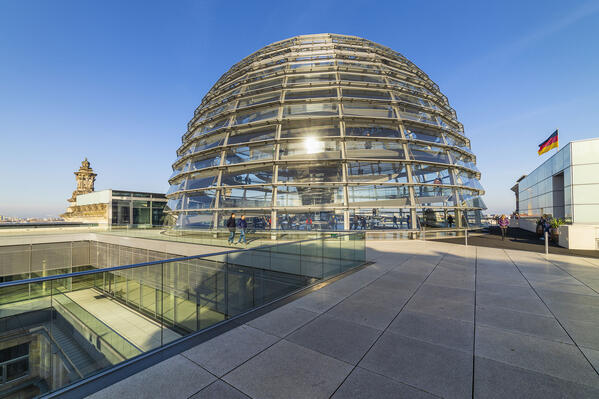Federal State

Germany is a parliamentary and federal democracy. The German Bundestag, the constitutional body most present in the public eye, is directly elected by citizens eligible to vote every four years. The most important tasks of the Bundestag The Bundestag The Bundestag is made up of the elected representatives of the German people. In principle elections to the Bundestag are proportionally representative, with each party’s share of the vote in the election reflecting the number of seats it occupies in the parliament. But the electoral system also… Read more › are legislation and to oversee the government’s work. The Bundestag The Bundestag The Bundestag is made up of the elected representatives of the German people. In principle elections to the Bundestag are proportionally representative, with each party’s share of the vote in the election reflecting the number of seats it occupies in the parliament. But the electoral system also… Read more › elects the Federal Chancellor Federal chancellor The Federal Chancellor is the only member of the Federal Government to be elected. The constitution empowers him to personally choose his ministers, who head the most important political authorities. Moreover it is the Chancellor who determines the number of ministries and their responsibilities… Read more › for the legislative period by secret ballot. Within the Federal Government Federal Government The Federal Government and cabinet is made up of the Federal Chancellor and the Federal Ministers. While the Chancellor holds the power to issue directives, the ministers have departmental powers, meaning that they independently run their respective ministries in the framework of those directives… Read more › the Chancellor has the authority to lay down guidelines, in other words determines binding broad policy . The Federal Chancellor appoints the federal ministers, and from among them a Deputy Chancellor.
In actual fact, however, it is the parties that make up the government that decide which persons will head the ministries they were allocated in the coalition negotiations. If a coalition collapses, the Chancellor can also fall prior to the end of the electoral term, as the Federal Government has the right to vote the head of government out of office at any time. In such cases parliament must, however, name a successor at the same time in what is known as a “constructive vote of no confidence”. This means that there can be no period of time without an elected government in office.
Coalition governments are the rule in Germany
The system of personalised proportional representation is decisive with regard to the character of the parliament. This way, smaller parties are also represented in the Bundestag The Bundestag The Bundestag is made up of the elected representatives of the German people. In principle elections to the Bundestag are proportionally representative, with each party’s share of the vote in the election reflecting the number of seats it occupies in the parliament. But the electoral system also… Read more › in proportion to their election results. For this reason, with one exception, the Federal Government Federal Government The Federal Government and cabinet is made up of the Federal Chancellor and the Federal Ministers. While the Chancellor holds the power to issue directives, the ministers have departmental powers, meaning that they independently run their respective ministries in the framework of those directives… Read more › has always been formed through an alliance of several parties that had competed against each other in the election; since the first Bundestag election in 1949 there have been 24 coalition governments. To avoid fragmentation in parliament and make forming a government easier, parties must poll at least five per cent of the votes cast (or three direct mandates) in order to be represented in the Bundestag (this rule is known as the five percent hurdle).
Germany’s federal character is revealed in the large level of independence the 16 federal states Federal states Germany is a federal state. Both the central federal government and the 16 federal states have independent areas of jurisdiction. The government in Berlin is responsible for foreign policy, European policy, defense, justice, employment, social affairs, tax and health. The federal states are… Read more › enjoy, in particular with regard to the police, disaster control, the law, and culture. For historical reasons the cities of Berlin Berlin Once a year, during the Berlinale film festival, the world of the silver screen focuses its attention on Berlin. And the city’s inhabitants are used to global interest. After all, the people of Berlin have lived in a capital city since 1458. However, there is also a shady side to the city’s history… Read more › , Hamburg Hamburg In the city and state of Hamburg it is the port that is the power-house of the economy, though with Airbus, Otto Versand and Beiersdorf also located here, this is not immediately apparent. The tanker terminals, mean that almost all the major oil-refining companies are represented in the port. For… Read more › , and Bremen Bremen The Hanseatic city of Bremen arose through classic maritime trading, in particular with coffee. In the smallest of the federal states (divided into the city of Bremen, and Bremerhaven, some 60 kilometers to the north) the port accounts for every fifth job. The largest private employer, however, is… Read more › are also federal states. The close links between the federal states and central government is unique, resulting in the state governments having numerous opportunities to play an active role in central government policy.
Great diversity of coalitions represented in the Bundesrat
This occurs primarily through the Bundesrat The Bundesrat The Bundesrat represents the federal states and alongside the Bundestag is a form of Second Chamber. It is obliged to deliberate on each federal law. As the chamber of the federal states, the Bundesrat has the same function as those Second Chambers in other federal states that are mostly referred… Read more › , the upper house, which is made up of members of the federal state The federal state The German federal state is a complex entity. It consists of a central Federal Government and 16 federal states. The Basic Law lays out which issues fall within the ambit of the Federal Government and which devolve to the federal states. As such the federal system in Germany is similar to that of… Read more › governments and is likewise in Berlin Berlin Once a year, during the Berlinale film festival, the world of the silver screen focuses its attention on Berlin. And the city’s inhabitants are used to global interest. After all, the people of Berlin have lived in a capital city since 1458. However, there is also a shady side to the city’s history… Read more › . Densely populated federal states Federal states Germany is a federal state. Both the central federal government and the 16 federal states have independent areas of jurisdiction. The government in Berlin is responsible for foreign policy, European policy, defense, justice, employment, social affairs, tax and health. The federal states are… Read more › have greater representation in the Bundesrat than smaller ones. By being coalition partners in federal state governments, parties that at federal level are in opposition, or not even represented in the Bundestag The Bundestag The Bundestag is made up of the elected representatives of the German people. In principle elections to the Bundestag are proportionally representative, with each party’s share of the vote in the election reflecting the number of seats it occupies in the parliament. But the electoral system also… Read more › , can thus potentially exert an influence on politics at federal level, as numerous federal acts and decrees require the approval of the Bundesrat.
Because there is no uniform election date for the federal state parliaments and the legislature periods vary, parallel to the legislative term in the Bundestag the balance of power in the Bundesrat can change several times. With the current constellation of the chamber of federal states, the Federal Government Federal Government The Federal Government and cabinet is made up of the Federal Chancellor and the Federal Ministers. While the Chancellor holds the power to issue directives, the ministers have departmental powers, meaning that they independently run their respective ministries in the framework of those directives… Read more › has no majority in the Bundesrat. There are no longer any distinct blocks demonstrating uniform voting behaviour, as there is more diversity with regard to coalitions in the 16 federal states than ever before since the foundation of the Federal Republic.
The Federal President is the most senior political person in the country
In terms of protocol the Federal President Federal President The Federal President is the head of state of the Federal Republic of Germany. He represents the country in its dealings with other countries and appoints government members, judges and high-ranking civil servants. With his signature, acts become legally binding. He can dismiss the government and,… Read more › holds the highest office. S/he is elected not by the people, but by a Federal Assembly convened specially for the purpose. Half of it is made up of the members of the Bundestag The Bundestag The Bundestag is made up of the elected representatives of the German people. In principle elections to the Bundestag are proportionally representative, with each party’s share of the vote in the election reflecting the number of seats it occupies in the parliament. But the electoral system also… Read more › , the other half of members elected by the federal state The federal state The German federal state is a complex entity. It consists of a central Federal Government and 16 federal states. The Basic Law lays out which issues fall within the ambit of the Federal Government and which devolve to the federal states. As such the federal system in Germany is similar to that of… Read more › parliaments in relation to the distribution of seats there. The Federal President holds office for five years and may be re-elected once. Dr. Frank-Walter Steinmeier has been Federal President since 2017. As an SPD politician he served as Federal Foreign Minister from 2005 until 2009 and from 2013 until 2017. Steinmeier is the 12th Federal President since 1949. Although the Federal President’s duties are primarily representational in nature, he can refuse to put his signature to legislation if he has doubts about it complying with the constitution.
Previous incumbents have exerted the greatest influence through public speeches, which receive great attention. The Federal Presidents refrain from becoming involved in party politics, but do tackle current issues and from time to time urge the government, parliament, and the population to take action.
The Federal Constitutional Court in Karlsruhe: guardian of the Basic Law
The Federal Constitutional Court The Federal Constitutional Court The Federal Constitutional Court is a characteristic institution of post-war German democracy. The Basic Law accorded it the right to repeal legislation passed as part of the legitimate democratic process should it come to the conclusion that such legislation contravenes the Basic Law. The… Read more › in Karlsruhe, which the population holds in very high esteem, exerts great influence. It is regarded as “the guardian of the Basic Law The Basic Law The Basic Law determines that Germany is a constitutional state: All state authorities are subject to judicial control. Section 1 of the Basic Law is of particular relevance. It stipulates that respect for human dignity is the most important aspect of the constitution: “Human dignity shall be… Read more › ” and through its important decisions provides a binding interpretation of the constitutional text. In two panels it passes judgement on disputes between constitutional bodies about areas of jurisdiction, and can declare laws to be incompatible with the Basic Law. Any citizen can appeal to the Constitutional Court if he is of the opinion that a law violates his basic rights.

